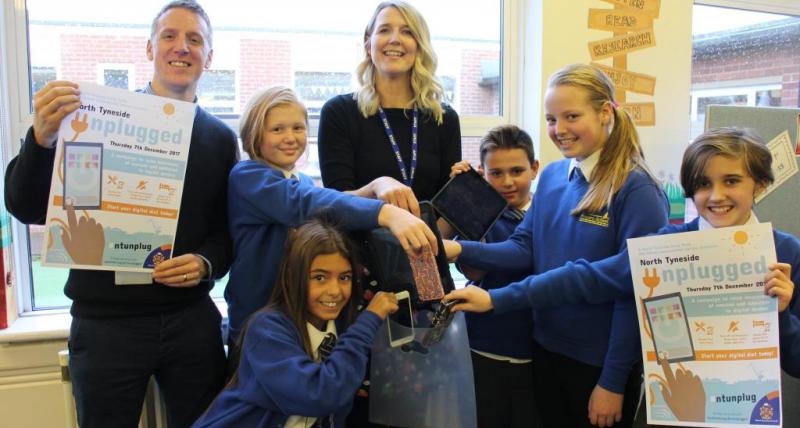
School children from all over North Tyneside will turn off their technology and go on a ‘digital diet’ as part of a council-led exercise.
On Thursday 7 December, children from at least 37 schools and childcare facilities across the borough will spend a day offline for North Tyneside Unplugged, an initiative by North Tyneside Council to raise awareness about the downside of technology.
Pupils will turn off all devices at the start of the school day and will have themed lessons, taught without the use of projectors or whiteboards, that will investigate the role of technology in the lives of young people,
Families may continue the exercise at home by having device free meal times and making sure that phones are charged outside the bedroom, where they can cause a distraction throughout the night.
Sarah Wallace, a Year Six teacher from Cullercoats Primary School, explained why her school was the first onboard.
She said: “It’s become so normal for people to have a device in their hand at all times and being without a phone does seem to fill people with dread.
“But if we can lead by example and promote the responsible use of devices at this young age we can bring some balance to the way they use technology and get some positive messages across.
“Switching off can help creativity and give the mind a rest. Young people need to see that the world won’t stop turning if they can’t get online for a few hours.”
The event is the culmination of a year-long project between the council and Dr Martin Lee, a consultant rheumatologist at Freeman Hospital, whose work examines the side effects of smartphone overuse.
Neil Brown, from North Tyneside Council’s School Improvement Service, said: “Technology is a wonderful thing that has enriched all our lives and changed the way we work, socialise, and play - but you can have too much of a good thing, as Dr Lee’s studies have shown.
“The event challenges young people to experience a full day without once glancing at a screen and to think about the issues in depth.
“We know that many will be itching to get back on their phones the next day, but I think will find this an engaging and thought-provoking exercise that will help young people to rebalance their lives and reconnect offline.
Dr Lee’s research has found links to sleep loss, poor concentration, mental and physical health issues, online safety dangers and problems with interpersonal relationships.
His nophonezone campaign highlights loss of sleep, loss of focus, never being present, loneliness and anxiety as just some of the side effects of smartphone overuse and suggests ways to redress the balance.
He said: “Smartphones and social media have fundamentally changed how we live our lives, and their functionality has had many positive impacts. However, it’s important to have boundaries that prevent them having a negative impact within our homes and on our lives.”
A host of North Tyneside businesses will also be promoting the scheme, including event sponsors Olives at the Station, Pirate Escape Rooms and Gravity Force Trampoline park.
Schools, businesses and families who want to take part can find out more at teachictnt.org.uk/ntunplugged and follow the build up on social media using the hashtag #ntunplug.
Dr Lee’s studies have found that:
- Almost half of 11-18 year olds wake up at least once a night to check their phone
- Almost a quarter of these check their phone more than 10 times per night
- Two thirds of students say that using their mobile devices at night affects their school work
- One quarter of students say they feel tired during the day because of how often they use their mobile phone at night
- Fear of Missing out (FOMO) creates anxiety and is associated with increased hormone release, the same hormone involved in addiction disorders.
- Research has also linked mental and physical health issues, online safety dangers and interpersonal relationship problems to the overuse of digital devices.
